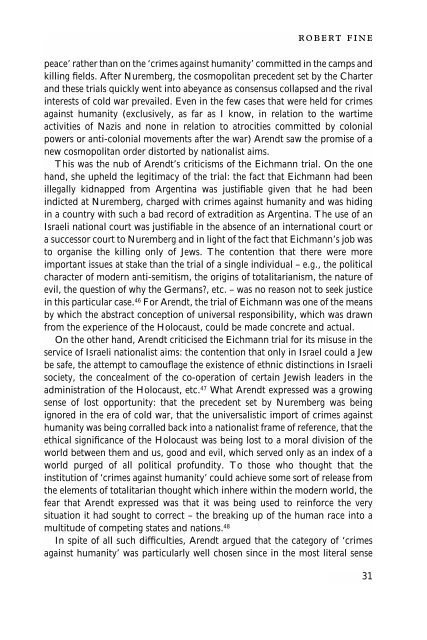You also want an ePaper? Increase the reach of your titles
YUMPU automatically turns print PDFs into web optimized ePapers that Google loves.
obert fine<br />
peace’ ra<strong>the</strong>r than on <strong>the</strong> ‘crimes against humanity’ committed in <strong>the</strong> camps and<br />
killing fields. <strong>After</strong> Nuremberg, <strong>the</strong> cosmopolitan precedent set by <strong>the</strong> Charter<br />
and <strong>the</strong>se trials quickly went into abeyance as consensus collapsed and <strong>the</strong> rival<br />
interests of cold war prevailed. Even in <strong>the</strong> few cases that were held for crimes<br />
against humanity (exclusively, as far as I know, in relation to <strong>the</strong> wartime<br />
activities of Nazis and none in relation to atrocities committed by colonial<br />
powers or anti-colonial movements after <strong>the</strong> war) Arendt saw <strong>the</strong> promise of a<br />
new cosmopolitan order distorted by nationalist aims.<br />
This was <strong>the</strong> nub of Arendt’s criticisms of <strong>the</strong> Eichmann trial. On <strong>the</strong> one<br />
hand, she upheld <strong>the</strong> legitimacy of <strong>the</strong> trial: <strong>the</strong> fact that Eichmann had been<br />
illegally kidnapped from Argentina was justifiable given that he had been<br />
indicted at Nuremberg, charged with crimes against humanity and was hiding<br />
in a country with such a bad record of extradition as Argentina. The use of an<br />
Israeli national court was justifiable in <strong>the</strong> absence of an international court or<br />
a successor court to Nuremberg and in light of <strong>the</strong> fact that Eichmann’s job was<br />
to organise <strong>the</strong> killing only of Jews. The contention that <strong>the</strong>re were more<br />
important issues at stake than <strong>the</strong> trial of a single individual – e.g., <strong>the</strong> political<br />
character of modern anti-semitism, <strong>the</strong> origins of totalitarianism, <strong>the</strong> nature of<br />
evil, <strong>the</strong> question of why <strong>the</strong> Germans?, etc. – was no reason not to seek justice<br />
in this particular case. 46 For Arendt, <strong>the</strong> trial of Eichmann was one of <strong>the</strong> means<br />
by which <strong>the</strong> abstract conception of universal responsibility, which was drawn<br />
from <strong>the</strong> experience of <strong>the</strong> <strong>Holocaust</strong>, could be made concrete and actual.<br />
On <strong>the</strong> o<strong>the</strong>r hand, Arendt criticised <strong>the</strong> Eichmann trial for its misuse in <strong>the</strong><br />
service of Israeli nationalist aims: <strong>the</strong> contention that only in Israel could a Jew<br />
be safe, <strong>the</strong> attempt to camouflage <strong>the</strong> existence of ethnic distinctions in Israeli<br />
society, <strong>the</strong> concealment of <strong>the</strong> co-operation of certain Jewish leaders in <strong>the</strong><br />
administration of <strong>the</strong> <strong>Holocaust</strong>, etc. 47 What Arendt expressed was a growing<br />
sense of lost opportunity: that <strong>the</strong> precedent set by Nuremberg was being<br />
ignored in <strong>the</strong> era of cold war, that <strong>the</strong> universalistic import of crimes against<br />
humanity was being corralled back into a nationalist frame of reference, that <strong>the</strong><br />
ethical significance of <strong>the</strong> <strong>Holocaust</strong> was being lost to a moral division of <strong>the</strong><br />
world between <strong>the</strong>m and us, good and evil, which served only as an index of a<br />
world purged of all political profundity. To those who thought that <strong>the</strong><br />
institution of ‘crimes against humanity’ could achieve some sort of release from<br />
<strong>the</strong> elements of totalitarian thought which inhere within <strong>the</strong> modern world, <strong>the</strong><br />
fear that Arendt expressed was that it was being used to reinforce <strong>the</strong> very<br />
situation it had sought to correct – <strong>the</strong> breaking up of <strong>the</strong> human race into a<br />
multitude of competing states and nations. 48<br />
In spite of all such difficulties, Arendt argued that <strong>the</strong> category of ‘crimes<br />
against humanity’ was particularly well chosen since in <strong>the</strong> most literal sense<br />
31

















